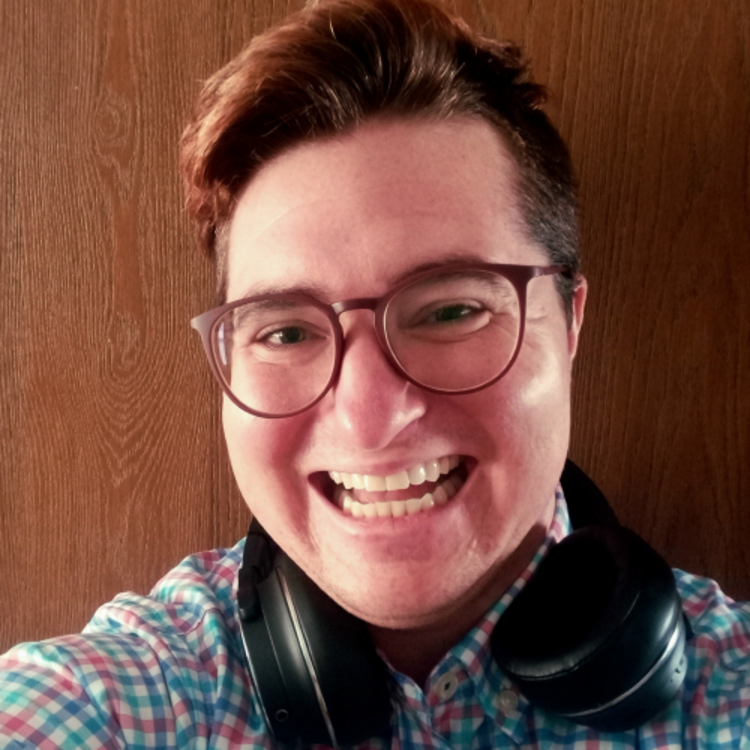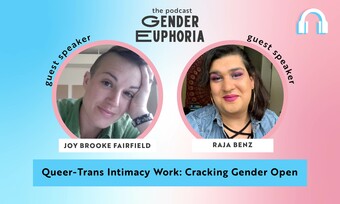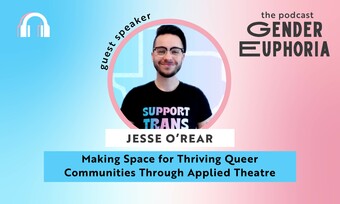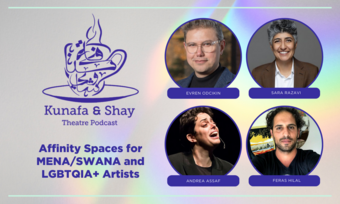Introduction to Gender Euphoria
Rebecca Kling: Gender euphoria is...
Dillon Yruegas: Bliss.
Siri Gurudev: Freedom to experience—
Dillon: Yeah, bliss.
Siri: masculinity, femininity, and everything in between—
Azure Osborne-Lee: Getting to show up—
Siri: without any other thought that my own pleasure.
Azure: as my full self.
Rebecca: Gender euphoria is opening the door to your body and being home.
Dillon: Mmm. Unabashed bliss.
Joshua Bastian Cole: You can feel it. You can feel the relief.
Azure: Feel safe.
Cole: And the sense of validation—
Azure: Celebrated
Cole: —or actualization.
Azure: Or sometimes it means
Rebecca: Being confident in who you are.
Azure: But also, to see yourself reflected back.
Rebecca: Or maybe not but being excited to find out.
Nicolas Shannon Savard: Hello and welcome to Gender Euphoria, the podcast, supported by HowlRound Theatre Commons, a free and open platform for theatre makers worldwide. I’m your host, Nicolas Shannon Savard. My pronouns are they, them, and theirs. Gender Euphoria, the podcast aims to amplify the voices of trans and gender nonconforming theatre artists in the United States. I’m hoping here to create an opportunity for trans artists to be in conversation with one another about our experiences working in and on a field that has a tendency to tokenize us. Each of these conversations offers a space to share and explore the kinds of cultural work that trans/queer art is doing in the world from an intersectional perspective. Before I dive into the first episode, I want to tell you the story of how and why I came to produce this podcast. As a teacher and a scholar, I find it’s important to acknowledge how my own identity and my own narrative shape the content that I put out into the world.
I am a white, trans, genderqueer, theatre educator, scholar, director, and solo performer from rural New England. I completed my PhD in Theatre at The Ohio State University in the summer of 2021. I met many of the artists you’ll hear from in this series, through my dissertation research on contemporary transgender performance in the United States, which I began, in all honesty, to find the people like me. The other trans people in and around the world of theatre. I knew there was no way that I was the only one, even as the only visibly gender nonconforming student in my undergraduate theatre program. Even as I attended my first national theatre conference as a graduate student in 2017 and was told that I was “brave” for asking that the panel moderator use the correct pronouns for me. Even when I was sitting in so many rooms full of theatre scholars, professors, teaching artists, absolutely baffled about what to do with these trans and non-binary students who were all of a sudden appearing in their classrooms…or the ones who could hypothetically come into the classroom one day but who, of course, had never been there before.
Nicolas: As I began touring my solo shows on the Fringe Circuit in 2019—sometimes the only way to get cast is to write yourself onto the stage. I was told by one artistic director, “I’m so glad you’re here. It’s been such a long time since we’ve had someone like you here.” Someone with biting wit? Someone highly skilled at interactive performance? Someone who makes straight white men deeply uncomfortable? This idea that trans people are a new phenomenon, and a rare one at that, that I had encountered in these theatrical contexts mirrors a larger cultural discussion that ethnographer Andre Cavalcante calls the ideology of transgender impossibility. The ideology of transgender impossibility is this prevailing belief that transgender lives and ordinary lives—everyday lives—are mutually exclusive. Transgender people only exist in the public imagination as medical, psychological, and sexual oddities or are victims of extreme violence.
In the media, the narratives about transgender people focus almost exclusively on the details of medical transition, making spectacles of our bodies and, with rare exceptions, ignoring most other aspects of our lives…or passing up any opportunity for analysis of the larger structural and cultural forces that have kept our community invisible and marginalized. How this plays out in the world of theatre and live performance—in cis, straight-centered settings, anyway—is we can be trans or we can embody our other identities. Or we can have our work considered on its own terms.
In the past five or six years, we’ve had a rapid increase in visibility of the trans community and popular culture. With Time magazine declaring that we’d reached the “transgender tipping point” of media of visibility in 2014. When they had Laverne Cox on the cover, it was a big deal. However, in my interviews with seventeen trans artists working in theatre and performance, most artists reported that in their experience, this “tipping point,” it seemed had either not reached the theatre industry, or it had…but in complex and not always helpful ways. More visibility, it seems, may have led to a small increase in trans roles, but only narrowly defined, usually white roles. Usually within a very narrow age range.
Nicolas: It has led to more festival invitations, but often in a way that is tokenizing. For many of us, this increase in visibility, our participation in festivals, and one-off events has not led to more work on mainstream stages. We are still rarely considered for roles that are not explicitly written as trans in professional performance settings. Some artists even reported that after coming out, they were suddenly only called upon to give trans-inclusion workshops when they had previously done a significant amount of work as a teaching artist in playwriting, design, and other areas of theatre entirely unrelated to their trans identities.
What this increase in visibility has led to is queer and trans artists being able to find one another. Cis, straight gatekeepers may not be inviting us into the theatre—and I have found are largely underprepared to engage in conversations that extend beyond pronouns and bathroom access—but queer and trans artists have for decades been producing each other's work and creating spaces for ourselves.
And that is what I aim to do with this podcast. I want this to be a space where trans and gender nonconforming artists can come together and be in dialogue with one another in a public way about the innovative work that we are doing. In this space I want to shift the conversations that we get to have from the near-exclusive focus on our bodies and trans-101 sessions to the important and highly nuanced cultural work that trans and gender nonconforming artists are doing. The naming of the series, too, aims to signal a shift away from a cis, white gaze to frame trans performance from a trans perspective. Gender euphoria is an experience of joy and alignment in self-expression, embodiment, and/or affirming community. While so many of our cultural narratives frame transness through the lens of tragedy, this podcast highlights the joy, resilience, and creativity of trans and gender nonconforming artists, countering pop culture narratives that trans people have appeared only in the last few years. Two core ideas underline every conversation. One: trans people are everywhere. And two: we have always been here.
Nicolas: Topics will include the overlap of performance and trans activism, community building, building trans and queer-inclusive rehearsal rooms, trans theatrical aesthetics, and the histories upon which contemporary trans performance is built. Guests will include trans and gender nonconforming artists whose work bridges performance with academia, corporate training, producers, and community organizing. In this series, you will hear from artists like Joshua Bastian Cole, Dillon Yruegas, Siri Gurudev, Azure D. Osborne-Lee, D’Lo, Maybe Burke, Rebecca Kling, Scott Turner Schofield, and a few more guests later on in the season. In our conversations, we tend to cover both theatre and film/TV because many artists’ work spans both, and media visibility for trans people, especially right now, remains one of the biggest influences on the ways that we are seen, understood, and treated by audiences, collaborators, producers, agents, and educators. These forms must be in conversation with one another because our industry and our experiences as trans theatre artists do not exist in a vacuum.
There remains much to be learned by looking at trans representation and community more broadly, and acknowledging this overlap can help us both to investigate questions in other fields and within our own context. At the same time, this podcast aims to be in dialogue with trans artists and ask questions that our industry has yet to engage in or give us a platform to be in dialogue with one another. We ask questions like, “How have media tropes impacted the legibility of trans actors and characters for cisgender heterosexual audiences? What stories do we need to hear? Who do we need to see on stage to shift that? What would a gender-expansive, identity-based approach to casting trans characters and actors look like? Where do trans performance aesthetics come from? How can theatre criticism expand its understanding of what “counts” as a play to be more in conversation with aesthetics that have largely developed outside of the traditional theatre?
What role do trans artists play in educating a cisgender, heterosexual public about LGBTQ issues? And how can we make that process of stepping into the role of educator a more consensual one? How can we build a more inclusive theatre on the stage, in the rehearsal room, in the classroom? And what can trans and queer of color perspectives offer us as we attempt to create spaces in which everyone, in all of our intersecting identities, can have access and agency?” I hope you’ll tune into the HowlRound podcast channel at howlround.com, iTunes, Spotify, or wherever you get your podcasts as we grapple with these big, big questions. Tune in to our next episode, to hear from me and Joshua Bastian Cole. We are going to be tackling the “transgender tipping point” and trans tropes that need transforming. Until then this has been Gender Euphoria, the podcast.
Rebecca Kling: Gender euphoria is...
Dillon Yruegas: Bliss.
Siri Gurudev: Freedom to experience—
Dillon: Yeah, bliss.
Siri: masculinity, femininity, and everything in between—
Azure Osborne-Lee: Getting to show up—
Siri: without any other thought that my own pleasure.
Azure: as my full self.
Rebecca: Gender euphoria is opening the door to your body and being home.
Dillon: Mmm. Unabashed bliss.
Joshua Bastian Cole: You can feel it. You can feel the relief.
Azure: Feel safe.
Cole: And the sense of validation—
Azure: Celebrated
Cole: —or actualization.
Azure: Or sometimes it means
Rebecca: Being confident in who you are.
Azure: But also, to see yourself reflected back.
Rebecca: Or maybe not but being excited to find out.















Comments
The article is just the start of the conversation—we want to know what you think about this subject, too! HowlRound is a space for knowledge-sharing, and we welcome spirited, thoughtful, and on-topic dialogue. Find our full comments policy here